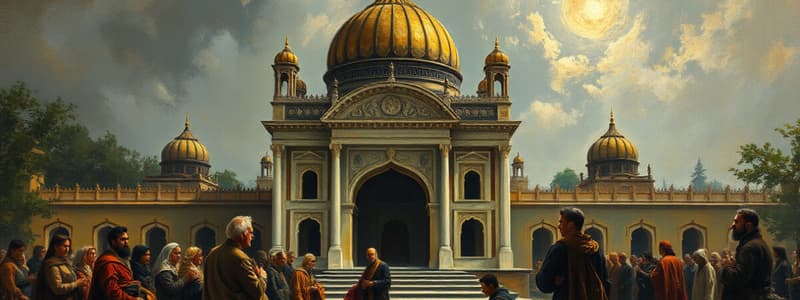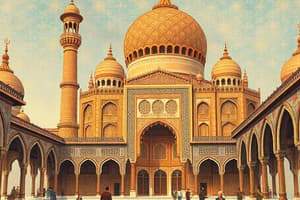Podcast
Questions and Answers
Which explains why Sultan Suleiman I of the Ottoman Empire was called 'Suleiman the Magnificent'?
Which explains why Sultan Suleiman I of the Ottoman Empire was called 'Suleiman the Magnificent'?
- He oversaw advances during a peak in the empire's history. (correct)
- He implemented new laws.
- He expanded the empire's territory.
- He constructed many monuments.
How did religious tolerance help the Ottoman and Mughal Empires succeed?
How did religious tolerance help the Ottoman and Mughal Empires succeed?
By showing religious tolerance, both empires maintained stability and earned loyalty from different peoples.
Which statement about the Qur'an is true?
Which statement about the Qur'an is true?
- It was compiled after Muhammad's death. (correct)
- It was revealed in pieces.
- It was written in Latin.
- It was published during Muhammad's life.
After which empire did the Ottoman Empire grow and expand?
After which empire did the Ottoman Empire grow and expand?
What art style is exemplified by intricate patterns and designs?
What art style is exemplified by intricate patterns and designs?
What influence did the Ottoman and Mughal empires absorb from other cultures?
What influence did the Ottoman and Mughal empires absorb from other cultures?
Which dynasty was in power during Islam's Golden Age?
Which dynasty was in power during Islam's Golden Age?
Name one invention during the height of Muslim power.
Name one invention during the height of Muslim power.
What is a Hajj?
What is a Hajj?
Where do Muslim pilgrims travel to as part of their religion?
Where do Muslim pilgrims travel to as part of their religion?
What is the Arabic word for God?
What is the Arabic word for God?
What brought an end to Islam's Golden Age?
What brought an end to Islam's Golden Age?
Flashcards are hidden until you start studying
Study Notes
Ottoman Empire Highlights
- Suleiman I, known as "Suleiman the Magnificent," presided over a period of significant advancement during the height of the Ottoman Empire.
- The Empire expanded notably following the conquest of the Byzantine Empire, enhancing its power and influence.
Religious Tolerance and Success
- Both the Ottoman and Mughal Empires practiced religious tolerance, which fostered stability and garnered loyalty from diverse populations within their realms.
- The acceptance of various faiths contributed to the empires' prolonged successes.
Qur'an Facts
- The Qur'an, the holy book of Islam, was compiled after the death of the Prophet Muhammad, ensuring the preservation of his teachings.
Islamic Art and Culture
- Arabesque is a notable art style characterized by intricate patterns often found in Islamic art, reflecting the cultural richness of the time.
- The Ottoman and Mughal empires integrated religious influences from other cultures into their own artistic and architectural developments.
Islamic Golden Age
- The Abbasid dynasty was in power during Islam's Golden Age, a pivotal period marked by advancements in various fields, including science and culture.
- Innovations during this time included the astrolabe, an important navigational tool that demonstrated the era's scientific progress.
Religious Practices and Beliefs
- The Hajj, a pilgrimage to Mecca, is a crucial religious duty for Muslims, symbolizing dedication and obedience to God.
- Mecca serves as the primary destination for Muslim pilgrims, reinforcing the centrality of this city in Islamic faith and practice.
Key Terms
- Allah is the Arabic word for God, representing the monotheistic essence of Islam.
- The Mongol invasion is recognized as a significant event that marked the decline of Islam's Golden Age, disrupting cultural and intellectual advancements.
Studying That Suits You
Use AI to generate personalized quizzes and flashcards to suit your learning preferences.



